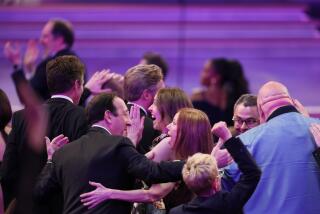SUSSKIND’S DEATH DIMS THE MEDIUM
- Share via
It’s hard to believe that television is still around with David Susskind gone. Since the goggle box first flickered into our lives, this small, elegant, white-haired entrepreneur (who died Sunday in New York at age 66) has been an integral part of it, as much as any tube or wire or aerial.
In fact, when you despaired of the medium ever providing anything but the river of sludge flowing over the air, the cops and cowboys and squealing tires and gunfire, the inane comedies and senseless violence festooned with the whining, wheedling repetitive monotony of the commercials, when you reached the point that you wanted to toss the box and all it contained in the ashcan, there stood Little David.
His immaculate productions, intelligently conceived and executed and often able to touch you where you live, made you fall in love with the machine all over again--productions such as the Olivier “Moon and Sixpence” and “The Power and the Glory,” such as Julie Harris in “Ethan Frome,” like that celebration of an American icon, “Eleanor and Franklin” and its sequel, “The White House Years.”
Or the three seasons of “The Play of the Week,” when TV achieved a weekly level of quality it has rarely approached since. Or such achievements as preserving on tape Lee J. Cobb’s definitive Willy Loman in “Death of a Salesman” or John Gielgud’s “Age of Kings.”
Oh, it was said of Susskind that he was about as creative as a cash register, that he could package the Second Coming if there was a buck in it. But the fact remains that over the years what Susskind packaged were among the finest artistic achievements of the medium. He was a class act.
Moreover, I remember well when he produced, without an underwriter, a remarkable study of Harry S. Truman with Ed Flanders playing the former President. Susskind carried the tape around the country looking for some corporation to pick up the tab, with no takers--but the show went on anyway. Not a buck in it for anybody.
He was utterly tireless and possessed of an unbounded enthusiasm, which is one of the reasons, I think, he could corral the Oliviers and the George C. Scotts and the like for his projects. When I first met him in New York 30 years ago, he was producing in that one year 100 specials for the three commercial networks--as well as producing a Broadway show and a couple of movies.
When he was executive producer of “The Play of the Week”--when that landmark series was presenting each production six times, nightly at 8 in New York--he inaugurated that nightly talkathon called “Open End” (wags called it “Open Mouth”) and presided over it nightly. If Susskind’s pretentions of political and social expertise were possibly overreached, it was “Open End” that Khrushchev chose for his major TV appearance in America, and it was Susskind to whom he talked.
His energy sometimes seemed superhuman, but then there was one view that he was supernatural. Larry Blyden had played Sammy Glick in a two-part Susskind production of “What Makes Sammy Run?” and he told me: “He’s not real. New York is the dirtiest city on earth--your clothes, your face, your hair, everything is always dirty if you work in this town. But not David’s. When he shoots his cuffs, they are always immaculate. There is never any soot on them. I tell you, he’s unreal.”
Blyden later did a short-lived comedy series for Susskind, “Joe and Mabel,” but the series was not really Susskind’s thing. Primarily he was a one-shot producer, the special, the individual effort. However, he produced a series that some believe was the finest ever made for television, “East Side, West Side,” which CBS unfortunately dropped after a season.
Perhaps one reason he was rarely involved with series is that after TV moved to Los ngeles, Susskind kept his operations in New York. He was in Hollywood occasionally, producing movies--such as “A Raisin in the Sun”--and he commuted here to talk with actors and writers and the various creative people he needed.
I saw him quite regularly when he came to the West Coast, sharing the table where he held court in the Beverly Wilshire, listening to his glib, confidential appraisements of projects and problems throughout the industry. Though he won many Emmys, one of his pet hates was the Emmy Awards and the catholicity of its multiple prizes, which he believed, quite rightly, diminished their importance.
About 10 years ago, when there was a cat fight going on in the Television Academy and there were reports there might not be any Emmy Awards, Susskind suggested that the nation’s TV critics get together and choose the prizes, a few prestigious awards to be given out on a national telecast instead of the multitude of Emmys.
Some of the better critics went along with the idea, but others turned on Susskind in their wrath in the ugliest and most vicious mud-slinging campaign I can remember in a generation of covering television. The awards show went on in the spring of 1977, almost exactly a decade ago, but the mud thrown at it killed any chance of it being an annual event. Too bad. It was a very classy show. Susskind was always a class act.
More to Read
The complete guide to home viewing
Get Screen Gab for everything about the TV shows and streaming movies everyone’s talking about.
You may occasionally receive promotional content from the Los Angeles Times.






